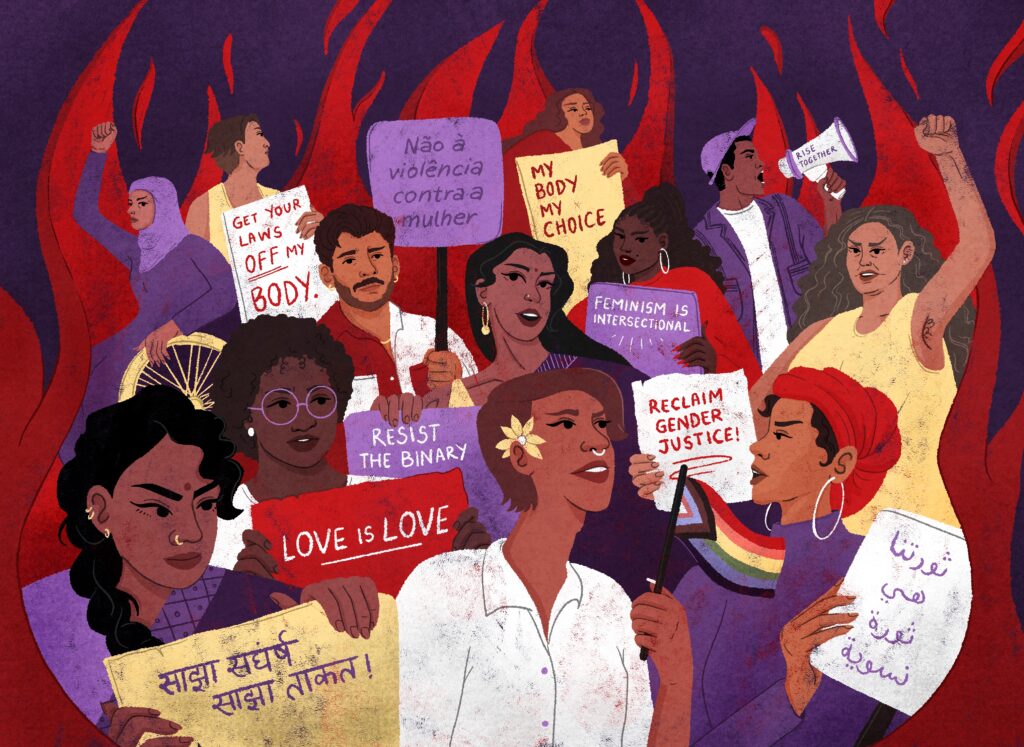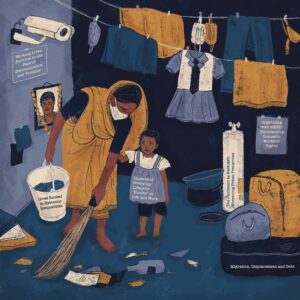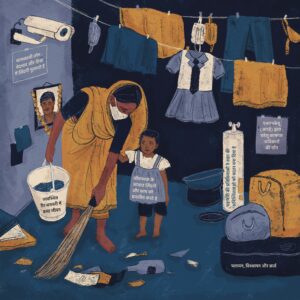Anti-gender discourses, a growing opposition to gender analysis, and a specific interpretation of ‘gender justice’ replacing ‘gender equality’ have gained visibility in Turkey following the rise of the Islamist de-democratisation approach of the ruling party Justice and Development Party (AKP). The party initiated a re-patriarchalisation process, pressuring women’s and LGBTQI+ activism.
AKP’s approach to gender presents an intriguing case. In its initial years, during Turkey’s European Union (EU) candidacy, the Islamist government, attempted to make legislative changes that would actually improve women’s position in society. However, with their consolidation of power and the end of Turkey’s candidacy, AKP gradually and more pointedly moved toward women’s traditional roles in the family as mothers and wives.
Signing the Istanbul Convention
When Turkey signed the Istanbul Convention in 2011 there was an emphasis on the empowerment of women. Professor Feride Acar, the first president of the monitoring body of the Istanbul Convention of the Council of Europe, Group of Experts on Action Against Violence Against Women and Domestic Violence (GREVIO), was in a pivotal position in finalising the treaty, also playing a part in naming the agreement after Istanbul.
Turkey was the first country to sign the convention. However, double-dealing was visible in the government’s policy making even then, as in the same year, AKP transformed the Ministry of State for Women and Family to the Ministry of Family and Social Policies. This was a red flag for the women’s movements, particularly about conservative attempts of the government to consolidate women’s domesticised status and rights within the framework of family.
Later in 2019, the government nominated another candidate to replace Prof Acar in contradiction with GREVIO’s candidacy criteria. After taking control of the convention’s monitoring mechanism, the AKP regime started to promote Islamic notions of ‘fıtrat’ (‘natural’ attributes of sexes) as the basis of their controversial definition of ‘gender justice’ more explicitly in public affairs.
With fıtrat, gender justice is celebrated as an Islamist alternative to the perspectives of equality advocated by ‘the Western imposed gender ideology’ in an increasingly authoritarian atmosphere. Turkish President Recep Tayyip Erdoğan emphasised women’s ‘delicate nature’ in his speeches several times, insisting that ‘women and men could not be treated equally because it goes against the laws of nature’, and he blamed feminists for not understanding ‘the special status attributed to mothers by Islam’.
Turkey’s Withdrawal from the Istanbul Convention
Turkey withdrew from the Istanbul Convention ten years after signing it, announced by a presidential decree at midnight on March 19, 2021. Ironically, the first country that signed the convention also became the first to withdraw. Under the pressures of the Covid-19 pandemic, massive protests by women’s and LGBTQI+ organisations took place in the streets and on social media challenging the government’s decision.
Women’s rights organisations and bar associations filed lawsuits against the decision to withdraw with a solid argument that Turkey ratified the Istanbul Convention via its National Assembly and thus withdrawal by a presidential decree is highly disputable. Despite this,the decision was declared final.
While the protests and challenges to the decision were continuing, President Erdoğan answered questions about the withdrawal in a live broadcast with university students. He argued that the convention does not bring an added value to the protection of women’s rights in Turkey, as national law No. 6284 already offers the required protection. He further presented Islam’s condemnation of violence against women as a formal reassurance.
Attempts to rationalise the withdrawal from the convention contributed to increased awareness of the backlash. The convention was declared a threat against Turkish family values in several speeches by government officials and was targeted as an untrustworthy tool of European cultural expansionism. This backlash gradually reached Law No. 6284, which was passed in 2012 for regulating the prevention of gender-based violence, as some members of the parliament asked for its annulment, with similar arguments of it being Western-centric. Özlem Zengin, a female attorney and vice president of AKP even found herself as the target of backlash actors, including her fellow party members, and received threats for stating that Law No. 6284 should continue to be the red line in Turkey against the violence targeting women.
Women’s movements have a long history of pressuring policymakers and amending laws in Turkey. Revisions in the Turkish Civil Code such as on article 159, which required women to have the permission of their husbands to be able to work (abolished in July 1992) and article 153, which entailed the sole use of the surname of the husband (changed in May 1997) were products of women’s movements. These amendments came as Turkish laws harmonised with European codes as part of the country’s accession to the EU. When the accession negotiations came to a standstill in 2018, gender backlash gained more currency, significantly weakening the rights and freedoms of women and increasing violence against women and gender minorities.
The ‘New Turkey’
With his latest election victory in June 2023, President Erdoğan has now initiated the discussion for a new constitution, which is expected to bring further regressive revisions to gender equality. Immediately following the election victory, President Erdoğan addressed his electorate in Istanbul from the top of his campaign bus, referring to every member of the opposition as ‘LGBT supporters [LGBT+]’ and he joined his supporters as they booed the opposition, continuing the tradition he started in his rallies before the election. LGBTQI+ has now become a shorthand that labels diverse strands of political opposition in the ‘New Turkey’ as a threat to the ‘sacredness of family’, and the ‘future of the nation’.
AKP refrains from using the term ‘gender’ in official documents, which is adopted by the new Turkish state in its authoritarian turn toward anti-gender directions. With Islamist nuances added to reverse its international use, ‘gender justice’ is turned in the state-sponsored lexicon and into a tool of backlash. In this lexicon, women are defined as ‘extensions’ of men; as mothers, wives and daughters.
Islamist women’s government organised and non-governmental organisation (NGOs and GONGOs) such as KADEM, normalise the neopatriarchal culture that limits women’s social presence with their participation in the labour market, as they collude by putting an added emphasis on women’s association with motherhood. Such pro-family discourses work to justify conservative neoliberal versions of masculinities in Turkey. It also shows that anti-gender approaches in AKP policies are rooted in their Islamist challenge to the universal notions produced by a long tradition of struggle for gender equality.
In the current period of backlash in Turkey, anti-gender politics plays a critical role in the strengthening of an authoritarian regime . The executive presidency regime bypassed the National Assembly in the process of withdrawal from the Istanbul Convention. The neopatriarchal state under the Islamist AKP, creates new hegemonic perspectives via pro-family and anti-gender nationalism, and the Islamist biopolitics in civil society in the ‘New Turkey’ demands the emergence of a new patriarchal bargain with the complex power relations around gender.


